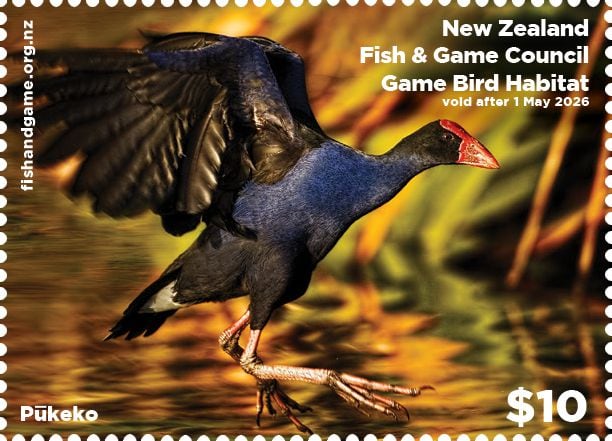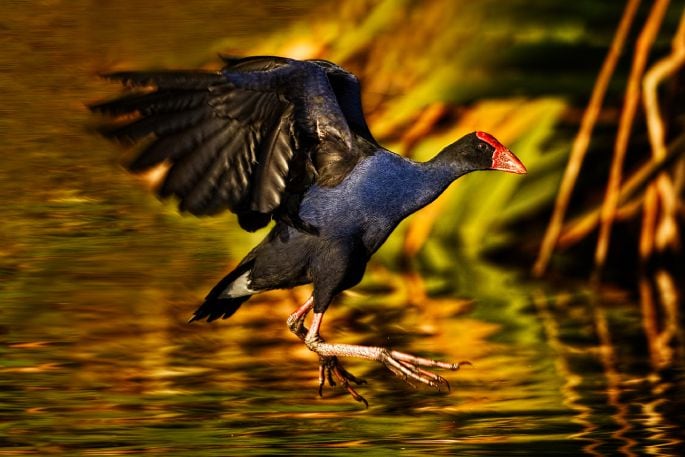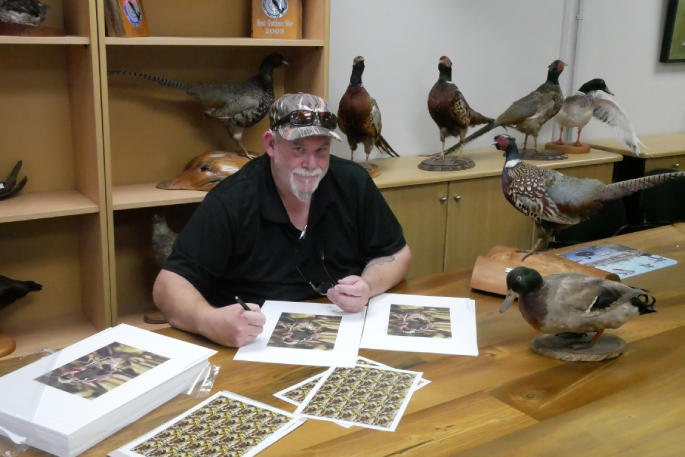A striking image of a pūkeko in flight has seen Northland hunter and photographer David Towgood named winner of the Game Bird Habitat Stamp Photo competition for the second year in a row.
The image captured by Towgood, who has been hunting for 40 years and photographing birds for 25, has been selected for the coveted 2025 Game Bird Habitat collectors’ stamp, to be fixed to game bird hunting licences.
It follows his success with a photo of a mallard drake in flight, which is featured on the 2024 stamp.
Hunters have so far contributed $2.4 million to wetland conservation through their game bird hunting licence as a portion goes to the Game Bird Habitat Trust (GBHT), which helps fund the development and enhancement of habitat for the benefit of game birds and other wildlife. The stamp is free on request to all licensed hunters and is also available for sale to the public.
This is the 31st year of the stamp programme, with the trust recommending a different game bird image to the NZ Fish & Game Council each year.

David Towgood's winning image on the stamp for the 2025 Game Bird Habitat Stamp competition.
Towgood received a $1000 prize and a $1000 KiIwell Sports voucher for the winning image, which was captured in swamp land northwest of Whangārei.
Towgood said he particularly enjoyed capturing images of birds in flight and the approach he used was like his game bird hunting technique.
“I’m honoured to be selected as the winner again. I spend quite a bit of time hunting, all based around swamps in the Northland area, and I really value the work the GBHT and Fish & Game NZ do to restore and protect wetlands.
“I photograph all kinds of birds but I’m not one for photographing a duck on a pond. It’s about capturing the moment. I use a 500mm fixed focal lens and do it all freehand, no tripod.
“I swing the camera in much the same way I hunt. Get the focal point — for me, that’s the bird’s eye — and press the shutter button. It locks in, and I get a sequence of shots.
“A lot of the technique is about knowing how the birds are going to act and respond. The rest is the equipment you use. My camera can take 10 shots per second in optimum lighting.”

David Towgood's winning image for the 2025 Game Bird Habitat Stamp competition. Photo/David Towgood.
Andy Tannock, chairman of the Game Bird Habitat Trust, said since its introduction, the Habitat Stamp programme has raised over $2.4 million for conservation projects on both public and private land.
“Hunters are major contributors to wildlife conservation throughout New Zealand, both through the millions of dollars they contribute and the thousands of volunteer hours they put in. The trust’s funding for projects enables many hectares of land a year to be restored or protected, with a particular focus on wetlands.
“We are working with wider community organisations on wetland management and restoration plans involving large and small projects across New Zealand. This has included major projects like the Para Wetland near Blenheim, Takitakitoa near Dunedin, and the Underwood Wetland near Dargaville, with funds also earmarked for the JK Donald wetland on the eastern edge of Lake Wairarapa, pending Regional Council, iwi and DOC approval.”
Fish & Game chief executive Corina Jordan said the organisation was proud to support the trust and its work. Regional Fish & Game field staff provided advice to landowners on proposed projects and act as referees for their consideration by the trust, while the National Office of Fish & Game provides administrative support to the trust.
“New Zealand continues to lose wetlands with an estimated only 9% remaining, so the contribution of hunters to the trust and its programmes is critical. The trust plays a key role in Fish & Game’s mission to protect, restore and rewild Aotearoa New Zealand’s natural freshwater habitats and species.”
Fish & Game manages trout, salmon, and game birds and helps New Zealanders to connect with nature and experience the many benefits fishing and hunting offers.
“We work to protect the environment that anglers and hunters have enjoyed as a tradition for over 150 years.”
The GBHT operates as an independent charitable entity. The Minister for Hunting of Fishing appoints its board members, who are selected for their habitat knowledge and wildlife management experience. These passionate volunteers provide expert oversight for the grant application process.
Applications for grants towards habitat development or enhancement can be made up until June 30 each year.
For further details and an application form, please visit the GBHT page on the Fish & Game website.



0 comments
Leave a Comment
You must be logged in to make a comment.